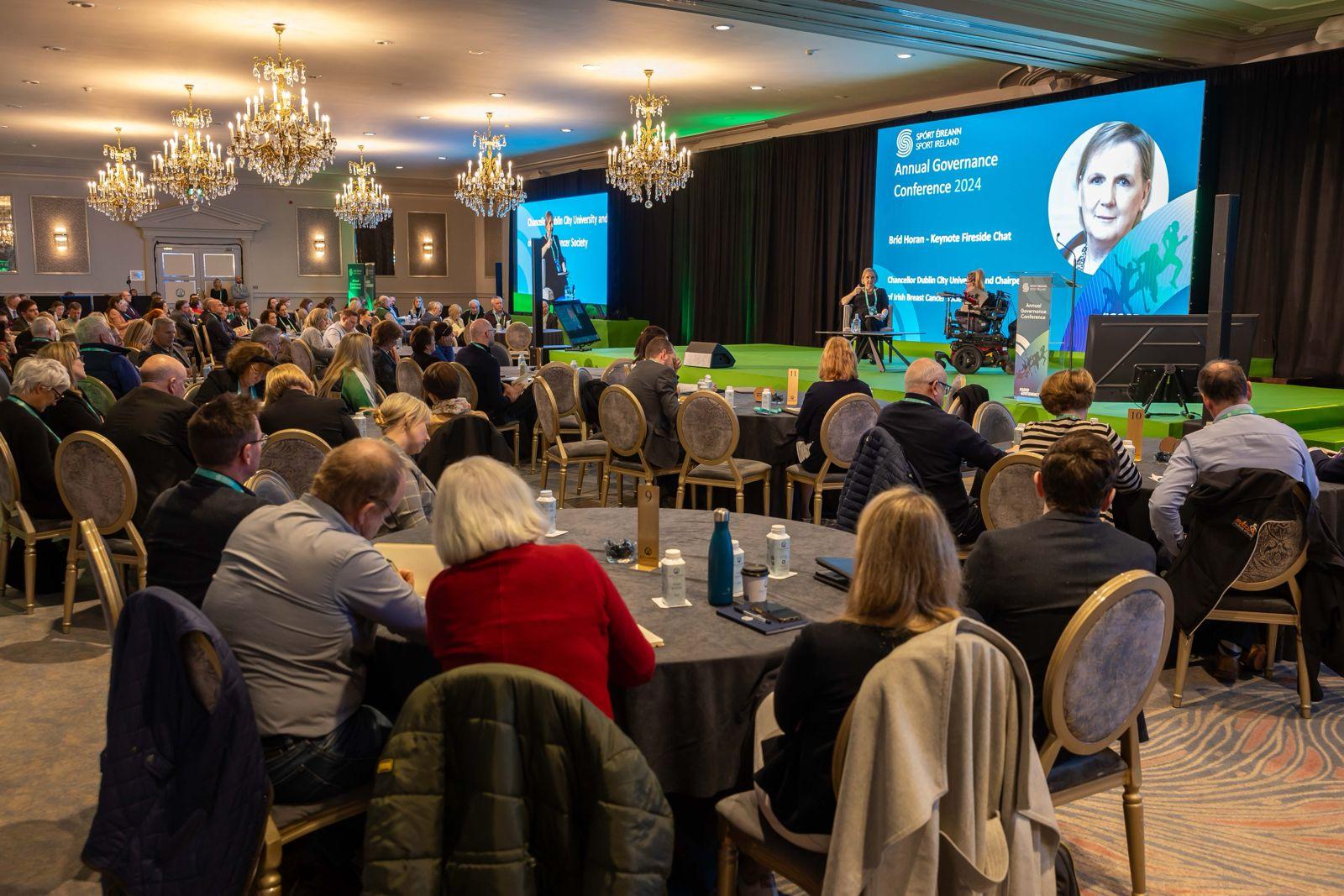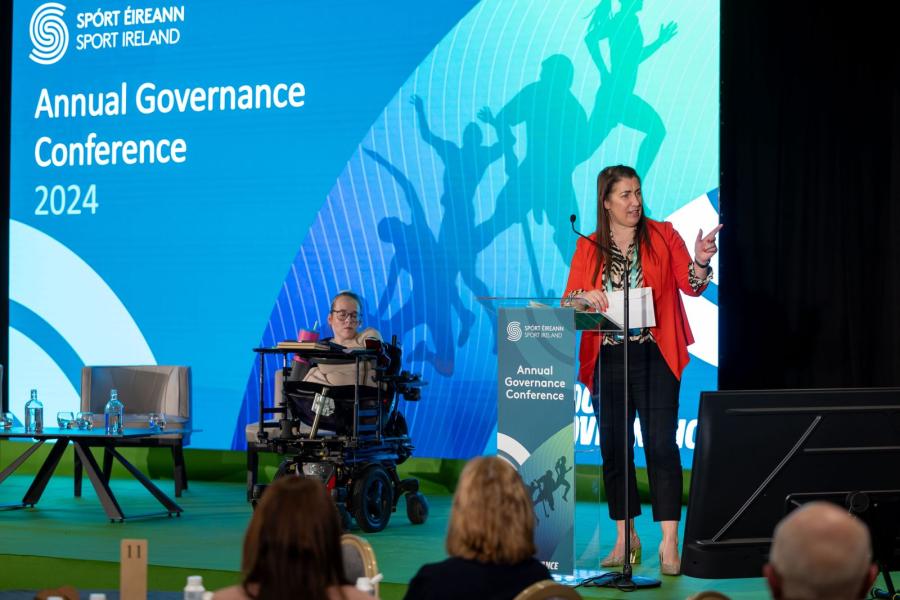
Empowering excellence in leadership: Insights from our Governance Conference
Governance Shaping Leadership and Culture was the theme for Sport Ireland’s 2024 Annual Governance Conference.
With nearly 150 attendees, including National Governing Bodies (NGBs), Local Sport Partnerships (LSPs) and Sport Ireland staff, this annual event captures Sport Ireland’s ongoing commitment to supporting, improving and enhancing the governance capabilities of our funded bodies.
Following a Women in Sport networking event and opening remarks from Sport Ireland chairperson John Foley and CEO Úna May, MC Joanne O’Riordan was joined for a fireside chat by Bríd Horan, the Chancellor of Dublin City University and Chairperson of the Irish Cancer Society. Their discussion provided a thorough insight from a business perspective into the intersection of governance, leadership and culture.
This session covered how governance can be a driver of organisational culture across industries, with Bríd providing attendees with a wider lens given her outside-of-sport perspective. As well as covering emerging trends and inclusivity with real-world examples, the discussion referenced leadership culture and performance, and cross-sector challenges in aligning leadership and culture.

Sport Ireland’s Director of Governance and Strategy Sinéad Gordon gave a presentation titled ‘From Policy to Practice’ on the Governance Code for Sport. She spoke about the foundations of the Code, which are based on the five key governance principles; Leadership, Exercising Control, Transparency and Accountability, Working Effectively, and Integrity.
Sinéad provided an update on the progress and supports Sport Ireland provides for the sector, as well as acknowledging the challenges of compliance with the continuous requirement for good governance, with many organisations now due to publicly restate compliance with the Code. She also gave an overview of emerging trends within sports governance and of the timely refreshing of the Code that would be a key focus for Sport Ireland during 2025.
Preparing for the future of governance includes focusing on balancing representation and expertise with more independent, skills-based criteria for board selections. There is also an increased focus on diversity, equity and inclusion with gender quotas and diversity targets, and sustainability and environmental, social, and governance (ESG) integration.
Other areas of focus include safeguarding and well-being governance with more independent complaint mechanisms, flexible governance models including athlete representation in decision making, integration of social impact metrics with broader societal goals, and improved governance evaluations and accountability.
Nora Stapleton, Sport Ireland’s Director of Strategic National Governing Body Programmes, then presented the findings of vital Women in Sport research that captured the views and experiences of leaders from across the sector via focus groups and survey participation.
From the responses, while an inclusive culture is growing in Irish sport, males have a more positive perspective than females on this progress. Females highlighted a noticeable difference in having a male ally, noting they still experience more barriers to leadership than males. This is most often relating to work-life balance and family responsibilities.
An interactive networking session led to some engaging discussions on how those in attendance - as organisations and leaders - can play their part in developing future leaders, in building resilience and mental toughness, creating inclusive cultures, setting and living core values, and strengthening the practice of the Governance code for sport with regards to leadership and culture.

Cricket Wales Chief Executive Barry Cawte delivered the second keynote address of the day, focusing on governance as the blueprint for leadership and culture within sport.
This session explored how governance frameworks set the tone for leadership behaviour, and highlighted the key elements of a strong leadership culture and the difference between hard and soft governance. He delved into governance and culture separately before he explained how governance creates a culture of integrity, inclusion, and collaboration.
Good governance, he said, needs a positive culture to be effective, and good governance is required to create this positive culture. Barry outlined his belief of the importance of putting people at the centre of the development process, in order to really deliver good governance.
On leadership, Barry detailed how the actions and behaviours of those at the top ripple throughout the entire organisation and then the sport. He stressed the important role leaders play in “setting the tone” with their priorities, their communication, and how they handle challenges by creating a blueprint for the culture and values others follow.
Barry’s three key takeaways were to remember that governance shapes leadership and culture, ethical leadership is essential, and the impact of governance is far-reaching and not to be underestimated.
A final panel discussion at the event in the Killashee Hotel, Naas, Co Kildare explored the key ingredients to creating effective cultures and the challenges and solutions to achieve these.

The three panelists were John Feehan, Chief Executive Officer of Basketball Ireland, Anne McCormack, Chief Executive Officer of Hockey Ireland, and Thos McDermott, Local Sports Coordinator of Active South Dublin.
The panelists reflected on their personal experience of building culture, changing culture and the leadership involved in navigating an organisation through governance challenges, leadership changes, and organisational or strategic changes that may have impacted on the organisational culture.
Among the topics discussed were the common cultural challenges they have faced such as integrity, inclusion, and balancing grassroots with high-performance objectives.
As well as what they see as the key ingredients in creating structures where a great culture can develop, the contributors also spoke about the importance of planning ahead, being willing to review practices, self-assess, and being open to change. They also spoke about the importance of transparency and accountability, building trust and their experience of empowering staff, participants and volunteers.
Following a day of networking, discussions, and presentations from some of the leading voices in sport, Sport Ireland highlighted what we can achieve by moving forward together to align governance, leadership and culture to work as one.
The event closed with a call to action to attendees to build on the momentum – by bringing the learnings from the 2024 Annual Governance Conference back to their own organisations to strengthen leadership, foster positive culture, and contribute to a thriving sport sector.